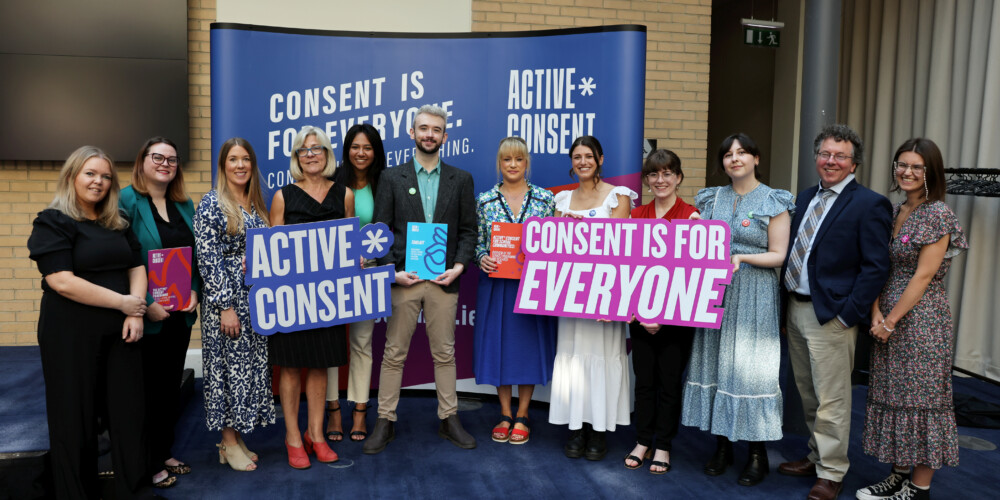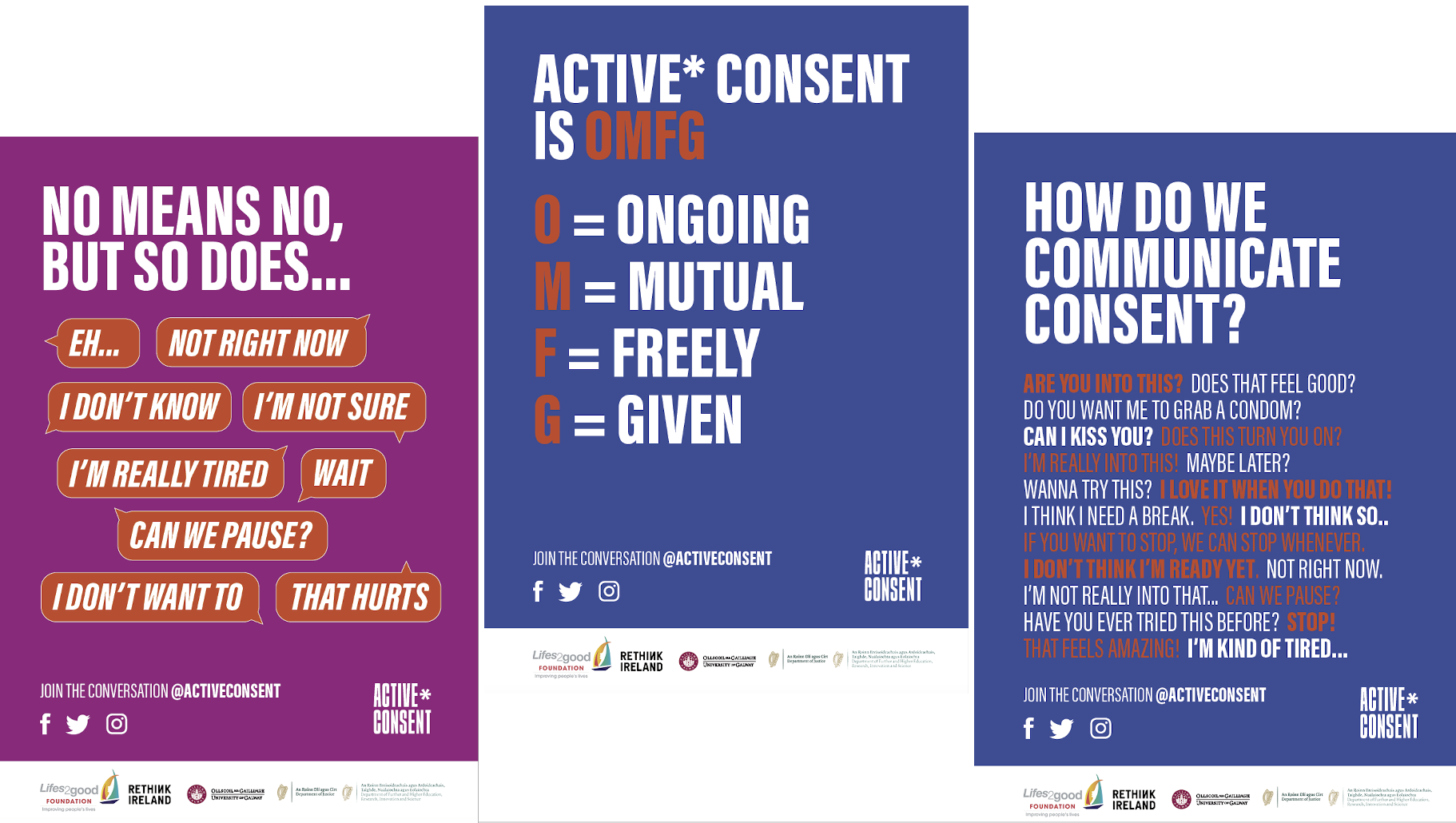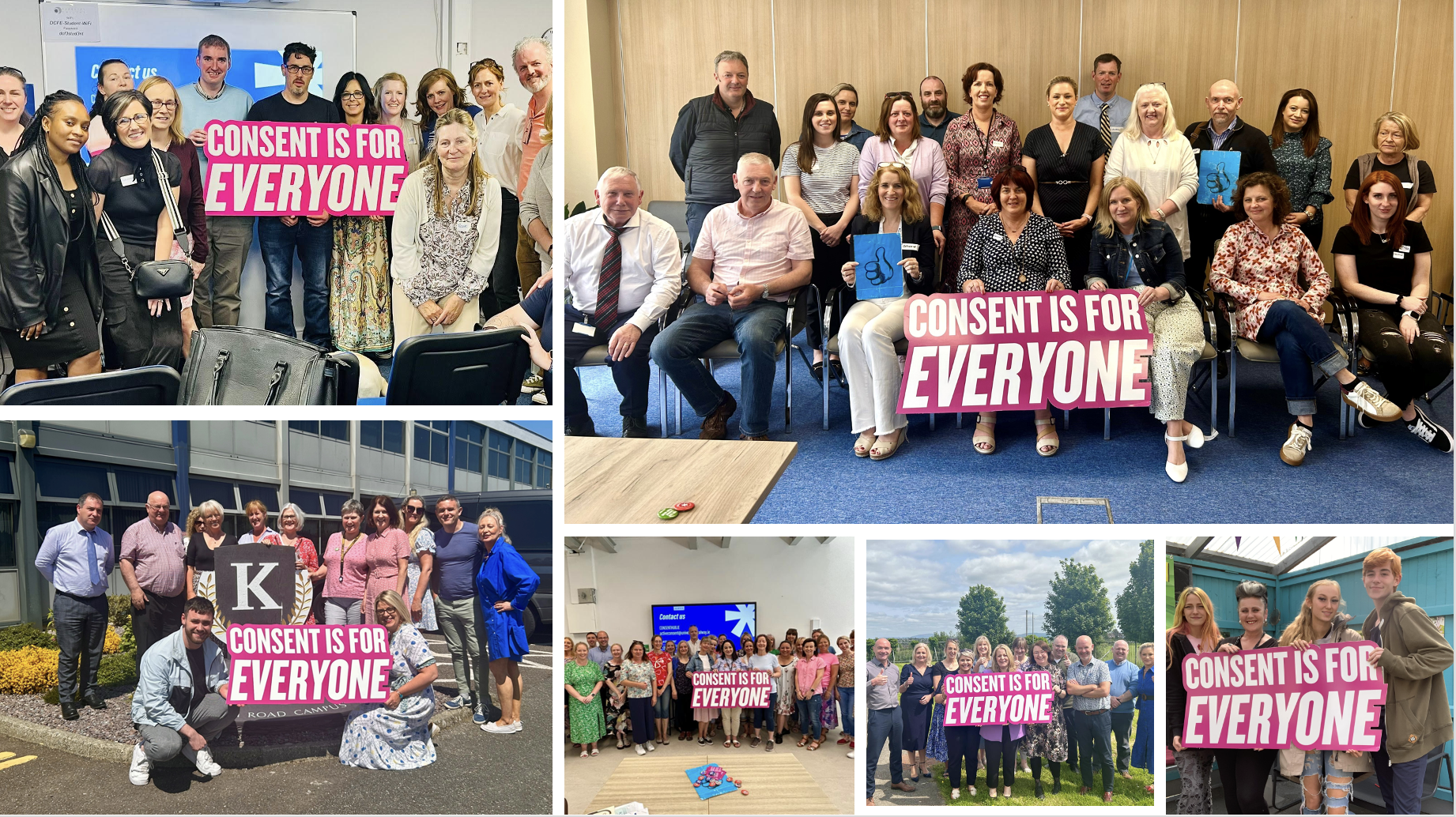
The Active* Consent Programme: Leading on sectoral culture change
Who we are
The Active* Consent programme leads education, training and education campaigns on consent, sexual violence and harassment across the island of Ireland. Building up an expertise in this area over the past decade, the programme has been fostered by the University of Galway’s core value of Respect, highlighted in the Shared vision, shaped by values (2020-2025) institutional strategy. The goal of the programme is that academics, researchers, professional support staff, and students will achieve the culture change needed to prevent sexual violence and harassment, to provide support for those who have been affected by these issues, and to bring our learning into the surrounding community in settings such as post-primary schools, sports, and further education. Supported by our institutional strategy and by the support of philanthropy, Government, and the university management, we developed a methodology in Galway to work toward this goal, and have since brought it to higher education institutions throughout the country, working in partnership with NGOs and student advocacy organisations.
What we did
Building continuously since beginning in Galway in 2013, Active* Consent scaled up from 2019-2022 to work with nearly all Irish HEIs as a national programme, addressing student needs on consent, sexual violence and harassment, while upskilling the staff who support them. Inspired by the University of Galway core value of Respect, we devised a tiered, spiral methodology that takes members of the university community from awareness raising, to deeper education, and in some cases an active role training and teaching others. The Active* Consent programme structures these forms of engagement around the concept of consent literacy, which is achieved when someone is:
(a) Personally knowledgeable, able to:
(b) Communicate openly with peers/partners
(c) Empower self/others to engage supports and services, and
(d) Respond proactively to non-consenting behaviour.
We supported HEIs to engage students, staff members, and inform their institutional policies – using a socio-ecological approach that sees the Higher Education institution as a complex environment where individual behaviour is impacted by peers, the learning and social community, formal policies and informal cultural beliefs. Along the way, we designed 20 separate evidence-informed offerings for awareness raising, education, and training. Students were engaged through consent workshops, eLearning modules, online resources, theatrical drama, and campus and social media campaigns. Higher Education staff were provided a 10-ECTS CPD module and participated in consent workshop facilitator training, videos, and briefing sessions. HEI staff and student leaders were trained to deliver these resources. This generated sectoral capacity to deliver Active* Consent programming, along with institutional ownership and networks.

Impact Achieved
The Active* Consent programme has had a wide-ranging impact in higher education, on national policy, and as part of the national discourse on consent.
HE students and staff
- 22,000 First Year students participated in HE workshops (2022-23):
90% recommend workshop participation and 91% learned something useful.
- 2,800 students attended our live consent drama (2022-23):
75% agree their understanding of consent improved.
- 1,500 HE staff and students have trained as consent workshop facilitators since 2016:
“Training really opened up people’s eyes … It generated really good conversations and moved the support services forward.”
- 170 staff have completed 12-hour ‘First Point of Contact’ disclosure skills training since 2021:
“One of the most relevant and important trainings I have taken part in.”
- 100 staff and student leaders completed our 10-ECTS CPD module since 2020:
“This training is essential for all staff and students – particularly managers and those in positions of influence.”

Sectoral
Active* Consent is now acknowledged as a leading national programme for consent that helps drive standards of excellence for the sector. The programme ethos is to engage other expert groups to produce the best possible training and engagement opportunities, working with groups such as the Union of Students in Ireland, Galway Rape Crisis Centre and Rape Crisis Network Ireland, and SOLAS / Education & Training Boards Ireland. In 2021 the HEA adapted the Active* Consent campus climate survey tool to assess student and staff experiences nationally, helping to ground its later implementation plan in the experiences and needs of our university communities.
Policy
Our impact on policy development is reflected in the contribution made to the DFHERIS Framework for Consent and in suggesting recommendations for the Ending Sexual Violence And Harassment In Higher Education Institutions Implementation Plan 2022-2024 (HEA, 2022). Active* Consent has been cited in publications and debates, in the Third National Strategy on Domestic, Sexual, & Gender-Based Violence Implementation Plan (2022), and on more than 30 occasions in Oireachtas debates, Parliamentary Questions, and the Joint Committees on Gender Equality, Education, Further & Higher Education.
National consent discourse
Active* Consent has made a significant impact on national media discourse on consent:
- 117 regional or national newspaper, magazine, or digital articles
- 55 radio and podcast interviews
- 6 television appearances
- 102,000 engagements across social media platforms
We took our methodology to school communities, engaging over 4,000 pupils in post-primary consent workshops in 2021-2022 and 1,300 pupils in live dramatic performances (2022-2023), leading to significant post-intervention attitude and knowledge change. Active* Consent also engaged diverse groups outside of academia, including Irish senior provincial rugby teams, An Garda Síochána, members of the Defence Forces, and Tusla.

What we learned
Scaling up across the HE sector
- Moving from individual-based student education to socio-ecological culture change addressing all HEIs and stakeholders was critical to the wider impact of the initiative.
- The role we have played as a ‘critical friend’ to HEIs has helped to meet institutions where they are at their point in the journey of culture change, providing our materials and training freely and openly.
- Annual engagement reports to HEIs on programme take up informs planning and maintains developmental dialogue and senior management buy-in aided institutional Action Plans.
- Adoption of tiered, spiral approach enables everyone to have basic awareness of consent / SVH, moving up to specialisation and the role of being institutional champions.
Adaptability of Programme
- The adaptability of the programme was evident during the COVID-19 pandemic when we enhanced online education and training, achieving mainstreaming in orientation programmes and over 40% of participants in workshops since 2020 are males.
- Reviewing and planning with university partners was key to returning to pre-COVID participation numbers e.g., with up to 90% of students taking part in orientation workshops in some institutions.
Valuing stakeholders, collaboration
- Establishing an interdisciplinary Active* Consent team was key to delivering diverse elements of programme.
- Partnering with subject specialist groups such as Galway Rape Crisis Centre helped to extend our own team’s capacity and expertise.
- Strong HE stakeholder relationships were achieved through open consultation and network building, and collaboration with individual institutions including Dún Laoghaire Institute of Art, Design and Technology, and the Royal College of Surgeons in Ireland.
- We worked with students as partners in co-production and co-delivery, and learned that staff really valued taking part in training alongside students.
Need for Open Access approach
- Our growing network required open access to resources, leading to the launch of ConsentHub in 2022.